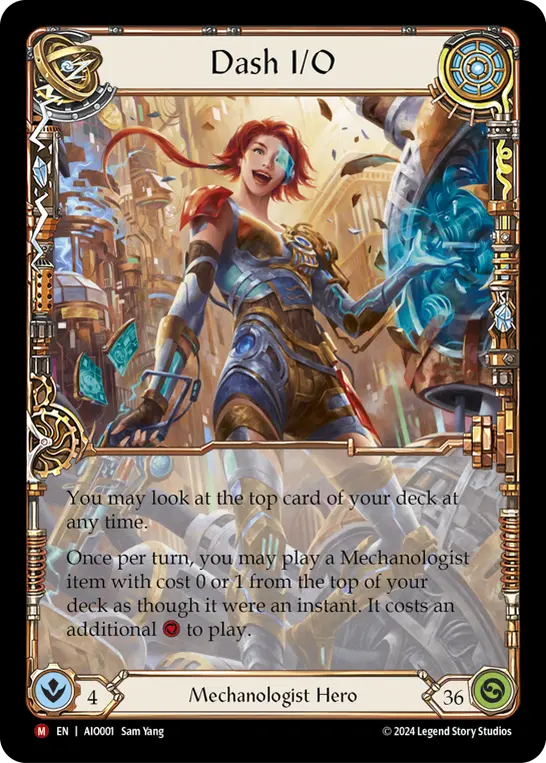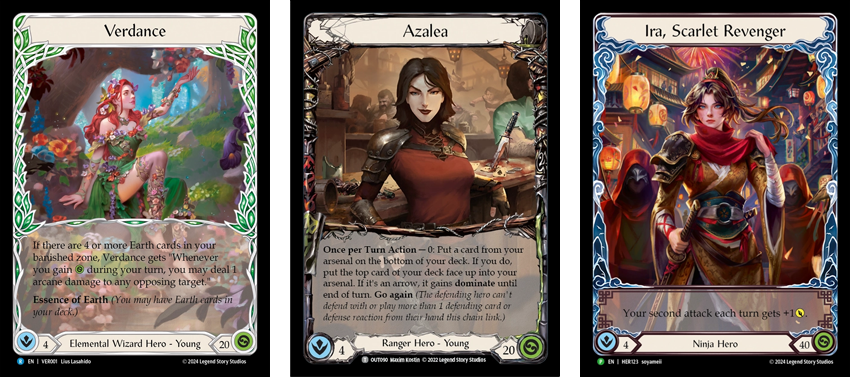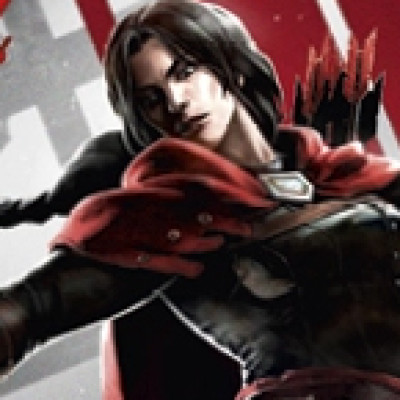It’s another night at my kitchen table. Two small cups of cold sake sit on the sidelines of the battle unfolding in the cardboard between myself and my soon-to-be wife. She’s been staring at her hand thinking about her turn for a few minutes now. I take a sip of the clear alcohol as she finally plays out her first card.
“Okay, I’m gonna play Barraging Beatdown. Intimidate!”
I set the glass down and hold out my hand face down. She takes one of my three blocks. She’s smiling. That’s not good. That’s never good.
“Next I’ll play Bare Fangs.” She draws her card and shuffles her hand, this time holding it out to me now. I pick one and flip it over. It’s Wild Ride. “So I intimidate once from Rhinar and it gets plus two power, so I’m attacking for eleven!”
I hold out my hand again as she rips the last three block from it at random. I look at my pair of two blocks, and my life total of four.
What a terrible day to be playing Azalea.
I put both my blocks and my remaining armor down. “Yeah, you got me,” I declare.
She smiles back at me. “Yes! I knew I could win with that hand!” She picks up her cards and begins shuffling again while looking at her empty sake cup and back to me. I smile and get up to get the bottle out of the refrigerator again, all the while silently plotting my revenge.



This is an average night for my fianceé and me. After dinner and a little time spent solitary to decompress from work, we often find ourselves in the dining room with a few preconstructed Blitz decks and some snacks. We both played trading card games growing up. While I was, and certainly still am, the more avid and competitively minded when it comes to these games, my bride is no slouch either. However, what we never did was invest time in playing them together because we both had other things we wanted to do together. While we have always been gamers, this is truly new ground for our relationship.
It would be easy for me to say something simple about how gaming brings people together and how wonderful it is to be part of the community, but if you are reading this article, you already know that. It’s not news to anyone invested enough to go to Armory or Prerelease that playing games connects us with others, and that it’s a truly wonderful thing. We’re social creatures, and shared experiences bring us closer to each other. However, I find the actual connection itself is lost in that realization, and too often we aren’t appreciating it enough for all it really is. We need to go beyond togetherness to consider the real impact gaming has on our personal lives and ourselves as people.
The Bonds We Share
My fianceé and I found Flesh and Blood at an extraordinarily difficult time in our relationship. Earlier this year, I accepted a new contract position in my field that took me to the other side of the United States for six months. The job required me to camp close to our project areas during the work week, which were too remote to receive cell service. We could only talk to each other, including texting, three of the seven days of the week. The stress from this job and the distance piled on enough that I became irritable and depressed most days. We started fighting more often.
To further exacerbate the situation, my fianceé was laid off midway through my contract. This scenario would be hard enough if we were in close proximity to one another, let alone when separated by 2,000 miles. With the end of my job finally in sight, we decided it would be best to fly her to me so we could do the couple thousand mile drive back home together. We purchased the ticket a couple weeks before she would depart, and planned for her to live with me for the final weeks of the project.
It would be a big leap for us. We had never been able to afford living together with our combined finances, and now we would be going from long-distance to immediately moving in together. We were confident we could handle it; and while we had all the tools at our disposal to succeed at this - and I strongly believe we would have no matter what - we owe our resounding success in no small part to the discovery of Flesh and Blood a couple weeks before she boarded the plane.
As a long time Magic: the Gathering player, I had been disgruntled with the state of the game for a few years. With waning interest - and a great deal of spare time in a small town - I remembered this game called Flesh and Blood existed. I decided to check it out, and I immediately fell in love just from learning about it.
After strategically (and not-so-subtly) bringing the game up to my partner a couple hundred times in a week, I finally bribed her enough to pick up some preconstructed Blitz decks from our LGS and bring them with her. The art and card layout piqued her interest immediately. The day after she landed, she was itching to play. We learned the rules together, and were quickly hooked.
Every night we cooked dinner together, and then cleared the table off to sling cardboard. We had never been so mutually fixated on something before. We played in almost every cheap AirBnB we stayed in on the trip home. In two months, it has already become a permanent fixture of our relationship. It’s not just because we love the game; it’s because of what we've learned about each other - and ourselves - by playing the game.
Getting Under the Hood
One of the recurring stumbling blocks of our relationship has been if one of us is seeking a solution or support when discussing a problem. Truth be told, this was often my own fault, as my task-oriented, problem-solving brain wanted to posit a solution instead of asking what she wanted first. Most of the time, what she was looking for was support.
On the other side of the coin, we sometimes had trouble understanding what the other was trying to do while solving a problem. It’s not that we don't trust the other, but we might look at the other and begin questioning what on earth they’re trying to accomplish.
We have always been good communicators – in fact, I would say it’s our strongest skill – but that does not mean we are perfect.
FAB has proven to be a major breakthrough on that issue. The game itself is a complex puzzle, and finding the right blocks or the correct time to take a large chunk of damage is critical to winning. Playing a turn cycle correctly is a difficult problem to solve, and one of many reasons why the game has a high skill ceiling. And we soon realized that the classes and decks we gravitated to - and how we play them - gave revelatory insights into how each of us sees problems and how we tackle them.


In my fianceé’s case, she latched onto Dash I/O and Rhinar immediately. Aesthetics drew her to Dash first, and she found the playstyle suited her as well. She loved Rhinar because she enjoyed throwing big attacks at my pitiful Ranger defenses, and of course winning with them. She has always been methodical and mechanically-minded, so seeing her take to aggro decks wasn’t a surprise. However, both of these heroes share a subtle similarity that isn’t obvious at first glance.
Both of these decks operate off an engine: a critical density of cards that meet a certain criteria to enable their hero abilities and cards. In Rhinar’s case, this is 6-power attacks, and maximizing them to reap the benefits of his attacks and hero ability. For Dash, this isn’t just about being only Mechanologist cards, but also the correct density of Boom Grenades, boost effects, and disruptive breakpoint attacks.
When my fianceé got her Dash Armory Deck, she quickly diagnosed the hiccups in an otherwise smooth gameplan. She started immediately tinkering with the ratios of items, breakpoints, and boost cards. I had the realization while playing against her that she wasn’t just pondering how to win a game - she was fine-tuning a machine as she test drove it. When she talked about her deck, she didn’t sound like she was describing a game. More often, she talked like she does when she's talking about welding, or figuring out how to fix my car.
Seeing this skill in a new context greatly increased the depths of my understanding of her as a person. I had always known she was better at keeping our day-to-day life going smoothly than I was. I always attributed it to her having better time management and memory than I did. However, I realized it wasn’t just that: it was her deep understanding of machinery, and the methodical nature of the application of those skills coming out.
It made me realize that when her solutions to my problems didn’t make sense to me, it was because I was approaching them as a complex problem solver, not as someone who can easily isolate cause and effect and make good step-by-step plans. This became especially apparent as my stress worsened in my contract, and she rightly pointed out more of my behavior was caused by mounting stress over other possible causes. I see it every day now, and I truly love her more for it.

For me, Verdance and Azalea resonated with me the strongest from our Blitz decks. Verdance scratched my itch to play defensive and bide my time until I saw the right moment to throw a big punch. It flexed my forward planning muscles, but also how to evaluate when I’m concerned by external pressure or not. It’s easier to take a chunk of damage when I can gain the life back on my turn, and deal arcane damage to boot.
Azalea, in turn, was all about performing under pressure. With Ranger having such light armor and a propensity for two blocks, every card in my hand mattered significantly more than they already do in FAB. Every decision point matters more when the punishment is greater. Using one card incorrectly is all it takes to lose a game as a Ranger in Blitz. To win, every decision must be careful, and every risk calculated.
In Classic Constructed, I fell in love with Ira, Scarlet Avenger as a midrange deck immediately. It’s approachable to new players and built for consistency, but knowing when Ira is the beatdown in the matchup and when to pivot between offense and defense is critical.
I am a linguist and archaeologist. My work is largely complex problem solving, gathering and interpreting data about humans, and knowing when to apply the correct scientific hypothesis or theory in research settings where there may not be a right answer, but there is certainly a most correct answer. I excel in difficult and complex situations, where the next step is not always clear. My fianceé always recognized this, and it’s one of her favorite traits of mine.
However, in light of playing FAB together, I noticed my partner asks me different questions to poke my brain now. Previously, she wondered why I saw something the way I did, and often struggled to understand my perspective on a given issue. We would always work it out together and did so healthily, but good communicators still have stumbling blocks.
Lately, I notice she asks me questions to figure out what exactly I see in a solution instead of being perplexed by it. On a deeper level, her tone has changed too. The air coming off her in these conversations carries a sense of, “of course you do.” Because we played a game together, my partner sees and better understands how my mind works, and she applies that to bettering our relationship.
Unpacking It All
Because my fianceé and I played a card game together, we understand each other on a deeper level, and we cherish that dearly. My most precious memories are those where I learned something new about the woman I swore to spend the rest of my life with, and the deepened trust that comes with those moments. And while we would have learned these aspects of each other in some other way had we never discovered Flesh and Blood, the fact is that we did learn it through FAB, and at a moment where we really needed it. FAB made living in the same house after being separated for six months easy. What could have been a stressful adjustment period was made trivial. The game is now part of a memory I cherish dearly because it taught me so much more about the woman I love. In order to see this, however, I had to see gaming as more than something that brings us together. I had to comprehend that gaming was creating a genuinely deeper connection with someone I love, not just bringing us together as people.
Gaming is, on a certain level, a gateway into the self. Andrew Henderson has made the case that your FAB hero explains something of yourself; and Alex Truell extrapolated from that how LSS might be actively using its heroes to speak to your deeper personality as a gamer.
And Flesh and Blood is certainly not the only community this applies to; it's arguably an element of every game. (Tolarian Community College discusses this on multiple occasions in the context of Magic.) It displays our inner workings for all to see, including the depths of ourselves we do not understand but exist nonetheless. Through that lens, others engage with and challenge our brains, without always realizing they are. Therefore, gaming is a part of each of our personal journeys of self-discovery, and we should cherish that we are a part of such a deeply personal aspect of each other’s lives.
This does not just apply to relationships with someone you are in love with. Games foster deep friendships in addition to deepening love. I find that, even though many of us have friends within the hobby, we don’t treasure those friendships or even recognize them, despite the impact they have on us. For some of my friends who struggle with social anxiety, the friends they made at their LGS are so dearly important to them because they do not have many other friends. I have transgender and genderqueer friends who only get called their proper names in gaming settings. The simple fact is, gaming is a setting where we make friends who see us as we truly are - where choosing how we present ourselves is inherent to the nature of the activity.
When I told others I was writing this article, I was inundated with personal anecdotes from FAB players who talked about much their friendships at their local game stores meant to them. I often hear from my fianceé how glad she is there is a community of FAB players nearby, and how excited she is to see them every week at Armory.
Gaming doesn’t just bring us together - it binds us together. All the insights I gained with my fianceé from playing the game together are the same glimpses we get from every new opponent we sit down across from at Armory. We learn a bit about them, and after enough times a truly beautiful friendship can come out from that.
However, in order to do that, we have to be willing to see and appreciate those bonds. We have to be willing to acknowledge and accept this connection on a more cerebral level. We have to see that this game establishes a deeply complex common ground, and thanks to that we can explore the depths of others. Oftentimes it happens without us even realizing it; we're each on a journey of self-discovery that we don’t always realize we are taking. We have to embrace the shared love of this game, and embrace others with it.
So what does this all mean? It means if you haven’t yet, you should build a second CC and Blitz deck to welcome a prospective player. It means you should let that budget-strained teen borrow the expensive equipment they can’t afford. It means you should take a newbie under your wing and mentor them in the game. All of these enable the journey of self-discovery we need to appreciate in Flesh and Blood. It's time for us to do more than let gaming bring us together. It shares the wonderful people and beautiful things gaming brings, and gives it to people who wouldn’t have it otherwise. We need to cherish the genuine connections and growth we experience in this hobby. If it's an important part of our individual lives, we should help it be an important part of others’ lives too.
Do more than be together. Be emotionally warm and open to each other, and allow yourself to explore the ways this game connects us. This game enables people and beautiful things to enter our personal lives. When you shift your thinking away from gathering and toward meaningful bonds, the results are beautiful.



